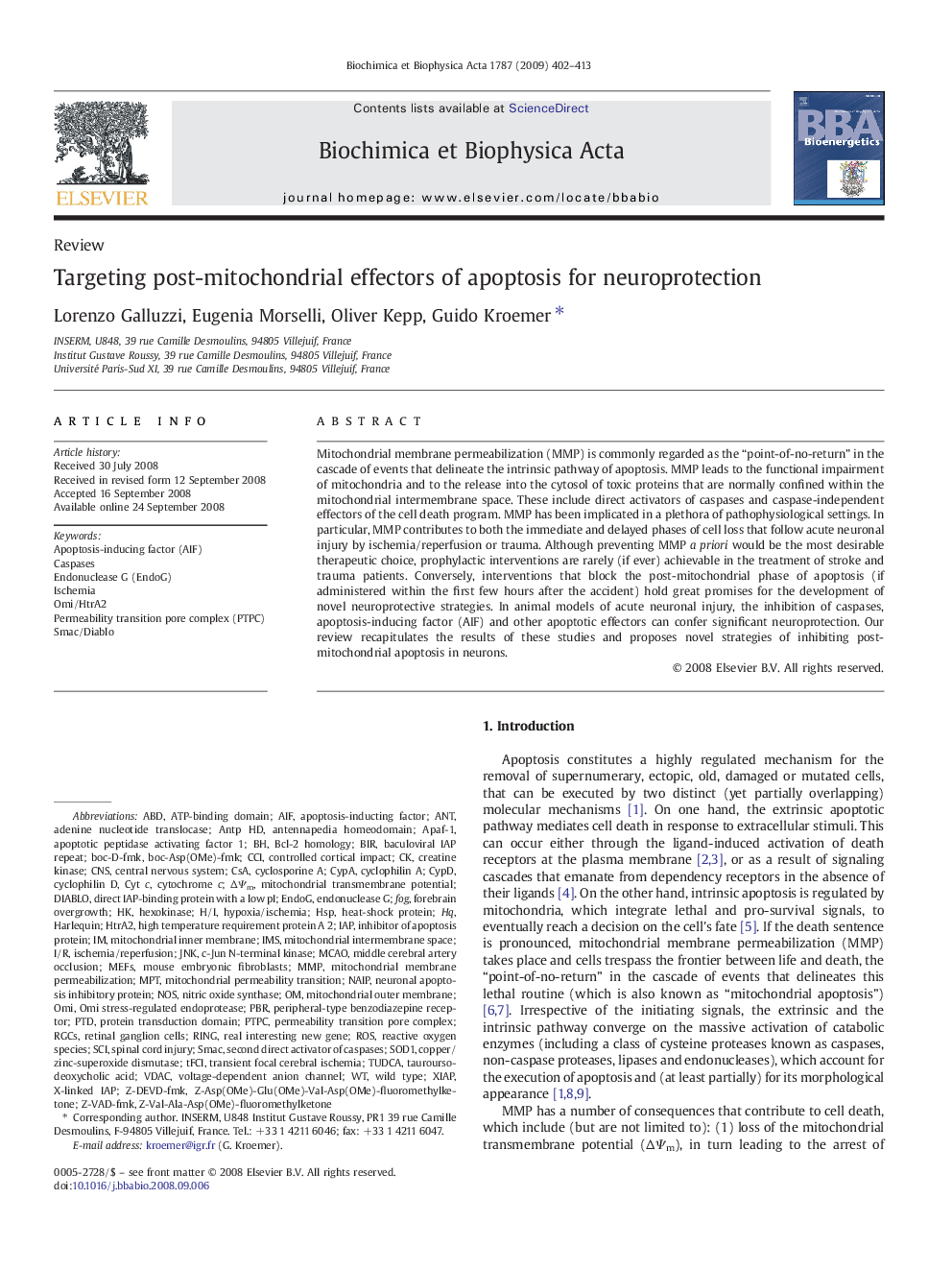| Article ID | Journal | Published Year | Pages | File Type |
|---|---|---|---|---|
| 10796013 | Biochimica et Biophysica Acta (BBA) - Bioenergetics | 2009 | 12 Pages |
Abstract
Mitochondrial membrane permeabilization (MMP) is commonly regarded as the “point-of-no-return” in the cascade of events that delineate the intrinsic pathway of apoptosis. MMP leads to the functional impairment of mitochondria and to the release into the cytosol of toxic proteins that are normally confined within the mitochondrial intermembrane space. These include direct activators of caspases and caspase-independent effectors of the cell death program. MMP has been implicated in a plethora of pathophysiological settings. In particular, MMP contributes to both the immediate and delayed phases of cell loss that follow acute neuronal injury by ischemia/reperfusion or trauma. Although preventing MMP a priori would be the most desirable therapeutic choice, prophylactic interventions are rarely (if ever) achievable in the treatment of stroke and trauma patients. Conversely, interventions that block the post-mitochondrial phase of apoptosis (if administered within the first few hours after the accident) hold great promises for the development of novel neuroprotective strategies. In animal models of acute neuronal injury, the inhibition of caspases, apoptosis-inducing factor (AIF) and other apoptotic effectors can confer significant neuroprotection. Our review recapitulates the results of these studies and proposes novel strategies of inhibiting post-mitochondrial apoptosis in neurons.
Keywords
copper/zinc-superoxide dismutaseΔΨmMCAOMEFsCCIIAPAPAf-1SOD1RGCsVDACCyclophilin ATUDCACypAXIAPMMPCypDZ-DEVD-FMKSMACDIABLOEndonuclease GPTPCbaculoviral IAP repeatHtrA2Apoptosis-inducing factor (AIF)Omi/HtrA2Antennapedia homeodomainX-linked IAPATP-binding domainMPTJnkOMIPTDIMSHspPBRANTNOSABDBIRc-Jun N-terminal kinaseI/RROSz-VAD-fmkSpinal cord injuryAIFHarlequinSmac/DIABLOTauroursodeoxycholic acidmitochondrial permeability transitionmiddle cerebral artery occlusionCSAIschemiaischemia/reperfusionTransient focal cerebral ischemiaadenine nucleotide translocaseEndoGRingProtein transduction domainCNSH/IRetinal ganglion cellscentral nervous systemCyclosporine Ascimitochondrial outer membraneMitochondrial inner membraneApoptotic Peptidase Activating Factor 1Mitochondrial intermembrane spacepermeability transition pore complexFoginhibitor of apoptosis proteinmouse embryonic fibroblastsNAIPMitochondrial membrane permeabilizationwild typenitric oxide synthaseBcl-2 homologyhexokinasehypoxia/ischemiaMitochondrial transmembrane potentialNeuronal apoptosis inhibitory proteinheat-shock proteinCaspasesvoltage-dependent anion channelCreatine kinasecontrolled cortical impactReactive oxygen speciesperipheral-type benzodiazepine receptor
Related Topics
Life Sciences
Agricultural and Biological Sciences
Plant Science
Authors
Lorenzo Galluzzi, Eugenia Morselli, Oliver Kepp, Guido Kroemer,
